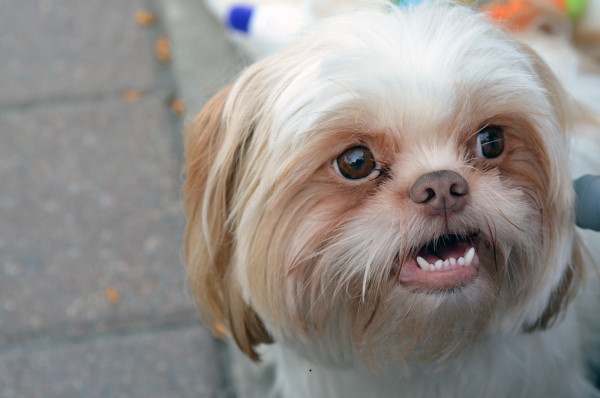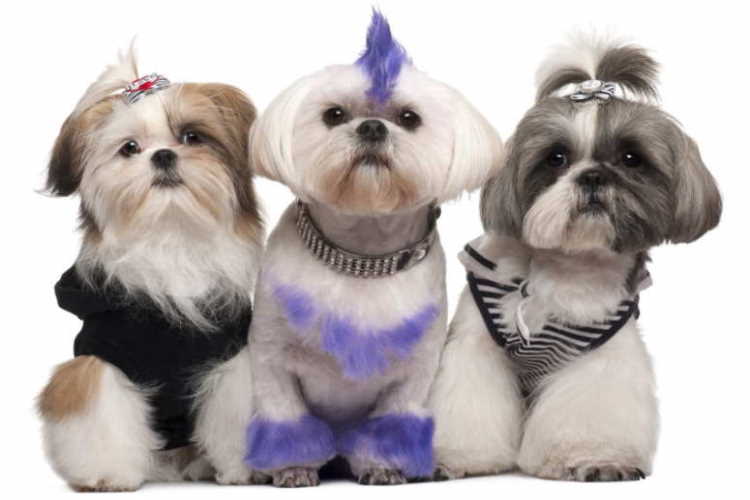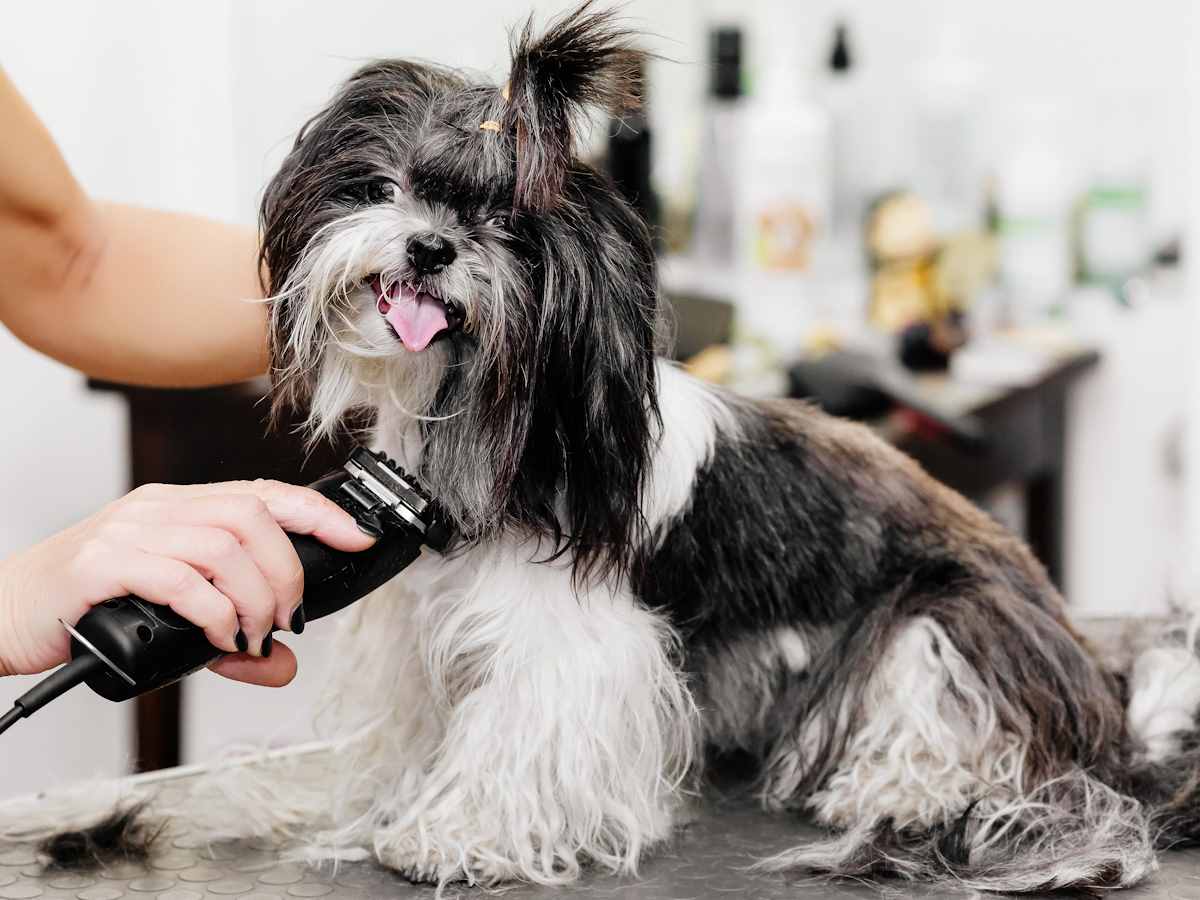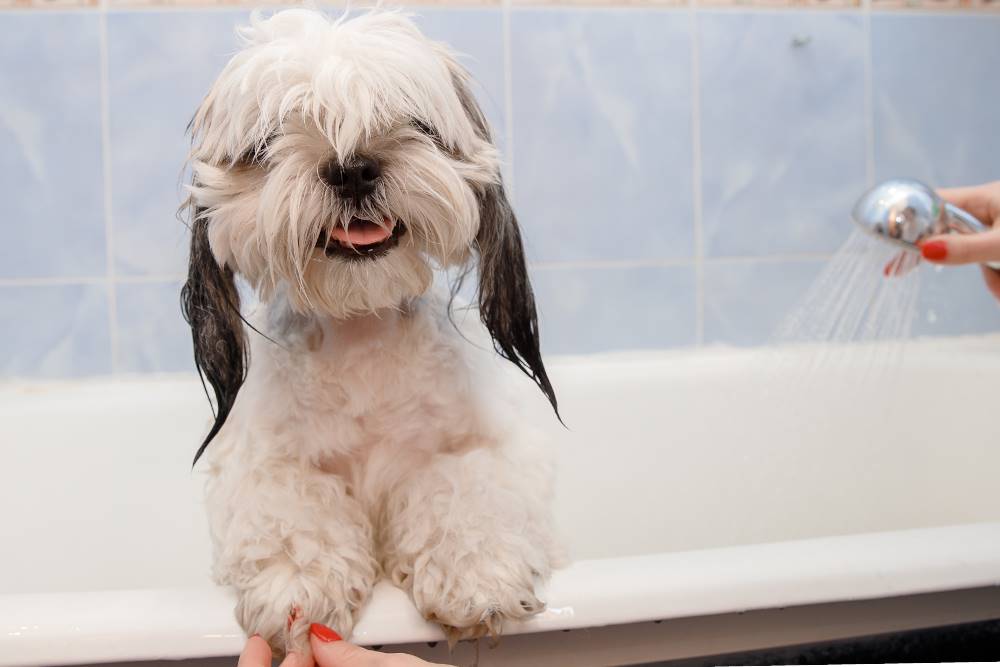How To Brush A Shih Tzu Teeth: and Why It's Important
WRITTEN BY MOLLY| EVERYTHINGSHIHTZU.COM
Most of us already know that brushing your Shih Tzu's silky coat is an essential part of their grooming.
In fact, if you have a Shih Tzu, then you probably are no stranger to the fact that your pup needs regular grooming to keep their beautiful coat in tip top shape.

But how about brushing his
teeth? Are we as diligent in brushing his teeth on a regular basis?
Admittedly I wasn't very good about taking care of my dogs choppers as I should have been in the early years, but that was mostly because I really didn't understand the importance of it or even know how to brush a dog's teeth for that matter.
Brushing a dog’s teeth is sometimes easier said than done, but after doing it a few times, it's really not all that hard.
The biggest thing that will make brushing your Shih Tzu’s teeth easier is establishing a routine with your dog early. Take baby steps to introduce them to the idea and get used to the tools.
Then stay consistent with your
teeth brushing routine, and of course, have lots of treats on hand for rewards!
Brushing a Shih Tzu's Teeth
Nothing about taking care of your precious canine companion should cause you anxiety.
If you find that you dread the thought of brushing your pup’s teeth, you may need to take some time to train yourself as well as your pup to calm down.
Dogs sense their owner’s emotions, and if your Shih Tzu picks up on the fact that you’re stressed, she is more likely to be nervous too.
Instead of having a panic attack every time you reach for your dog’s toothbrush, try out these steps to brush your Shih Tzu’s teeth.
Establish a routine early
The best way to ensure that brushing your dog's teeth doesn't always turn into a huge hassle is to start doing it early.
Begin brushing your dog's teeth when she is still a puppy.
If you get an older dog, then make sure to establish a routine with her as soon as you bring her into your home.
Starting early helps show your pup that this is something that is normal and routine. Plus, practice makes perfect.
The more experience (and exposure) your Shih Tzu gets to having her teeth brushed, the easier the practice will become.
After several sessions, your dog will know exactly what to expect (and that she's about to get some yummy treats), and she'll be a more cooperative pooch.
Use the right tools
No matter what task you're trying to accomplish, it's always easier when you use the right tools for the job.
There are a bunch of options available for cleaning dog's teeth. Don’t be overwhelmed; keep things simple.
All you need is doggy toothpaste (never use human toothpaste), which comes in awesome dog-approved flavors like peanut butter, beef, and more, and of course, a good toothbrush.
Since your Shih Tzu is a toy breed and on the tinier side of things, a finger toothbrush works really well.
You simply wear it on your finger, apply a small dab of toothpaste, and gently move it across your pup's teeth and gums.
Many of these toothbrushes are silicon and very gentle on your dog's gums, but if you do use a bristle brush, opt for one with soft bristles.
No one, man or beast, wants to put up with painful brushing and bleeding gums, which would be a surefire way to turn your dog off from the whole experience.
Baby steps first
Once you have the right tools, before jumping right in and brushing your dog's teeth, use a few sessions to simply introduce her to the tools, as well as to the whole concept of you fooling around with her mouth.
Gently pet your dog’s snout, lift her lips, look at her gums, and so forth, to let her get used to you handling her mouth.
Let her taste the toothpaste, sniff the tube and sniff and lick the toothbrush. This is how dogs learn about new things.
Don’t rush it; let your pup move at her own pace as she acquaints herself with these interesting, foreign items.
Next, gently tap the toothbrush here and there on her mouth and teeth.
The purpose of this is to let her see that these items are not scary. It also will give you a good indication of how much pressure your dog can tolerate.
Eventually, you can work up to a complete brushing session, which ideally should be done every day, and remember to always reward positive responses with treats.
What Technique Should You Use When You Brush Your Shih Tzu’s Teeth?
When you brush your dog’s teeth, start by lifting her lip to expose her teeth and gums.
Then, using a finger brush, use gentle motions to brush your dog’s teeth and gums, just like you would brush your own teeth.
It’s unlikely your dog is going to let you brush the back of her teeth, so concentrate your efforts on the outer surfaces.
Don’t forget to reach the back teeth!
Tartar can accumulate quickly on these hard to reach molars, as well as on the upper canines, so make sure to show those teeth some extra special attention!
As you brush your dog’s teeth, talk to her in a reassuring voice and stay calm and cool so your dog remains relaxed.
Are There Other Ways to Clean Your Dog’s Teeth?
If despite all of your efforts, your dog still resists having her teeth brushed, there are some alternatives.
You can use dental chews, special dog food designed to fight tartar buildup, solutions that can be added to your pet’s water, and more.
These options can definitely help care for your pet’s teeth, but they should be viewed as a supplement to brushing her teeth.
It’s important to realize that nothing is a substitution for good, daily brushing.
If You Brush Your Dog’s Teeth Daily, Do You Still Need Professional Cleanings?
The answer is a resounding yes!
Your Shih Tzu should have her teeth professionally cleaned at least once a year.
If your dog is more susceptible to dental health issues, more regular visits may be necessary.
Not only do professional cleanings help to maximize the health of your pup’s teeth by fighting tartar buildup, gingivitis, and gum disease, but they are also an opportunity to gain a clear picture of your dog’s overall health.
Why Do You Need to Brush Your Shih Tzu’s Teeth?
These steps are sure to help make brushing your Shih Tzu's teeth more manageable and less intimidating.
Remember, it's a necessary part of caring for your pet.
A dog’s oral health, similar to humans, plays a large role in her overall health -- not to mention it helps banish nasty doggy breath!
Proper oral hygiene can help prevent serious canine dental issues, infections, and other health issues like organ failure and heart disease, providing your dog with the opportunity to live a long and happy life!



